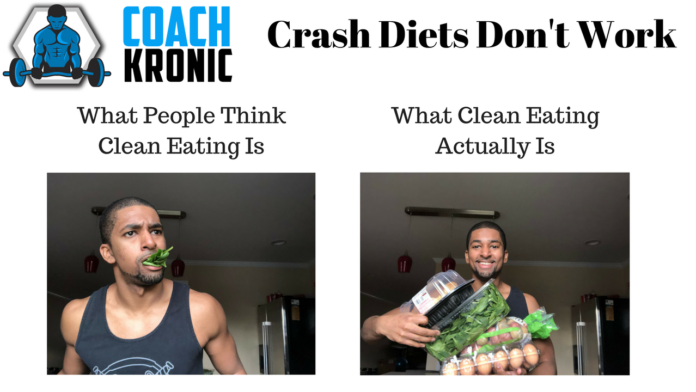Now that we see the common myths behind weight loss and how they can truly hinder our progress toward weight loss, let’s talk about Crash Diets.
What are “Crash Diets”?
They are essentially nutritional strategies that lead to an extreme caloric deficit (burning more calories than you’re eating), cut out an entire macronutrient (protein, carbs or fat), or just tell you to adapt a lifestyle that is not sustainable long-term. Detoxes, cabbage soup diets, no carb diets and water cleanses are some examples of these crash diets.
The main problem with these types of diets is that they are incredibly difficult to stick with for the long-term. We go into this cycle of dieting and restricting, binging and overeating, weight gain and then right back to dieting and restricting. With this approach, we are only addressing the symptoms and not the root cause of the issue: adherence. If a person can adhere to a lifestyle change over an extended period of time, they will be able to maintain their desired weight.
A concept called Yo-Yo Dieting or essentially period of weight gain to weight loss, are the result of these crash diets. Think about weddings, vacations, beach trips, or any other event based weight loss journey motivator. All these examples display short-term opportunities to lose weight to achieve the look one desires, but ultimately will not lead to any changes long-term. The body responds to rapid weight loss with a decrease in metabolism because it ultimately wants to go back to weight it was at before. Therefore, once we get off of this crash diet and go back to normal eating, the weight is put right back on and sometimes, you gain back more than what you started with!
If we can adapt a more flexible approach to eating that allows us to enjoy what we love, be more physically active and maintain a healthy caloric deficit, true weight loss and maintenance can be achieved. Don’t get me wrong, it’s not easy, but it’s doable. There is no single solution that works for everyone because everyone is different and responds to certain foods, exercise routines and lifestyle changes differently from a physical and mental prospective. Therefore, it’s important to try different things and see what works, and what does not work.
At the end of the day, use food as fuel 85% of the time and 15% of the time, eat what you enjoy. We cannot deprive ourselves of the things we enjoy because we won’t be happy. A life without happiness is not a life at all.
Sources:
Benton, David, and Hayley A. Young. “Reducing Calorie Intake May Not Help You Lose Body Weight.” Perspectives on Psychological Science, vol. 12, no. 5, 2017, pp. 703–714., doi:10.1177/1745691617690878.













